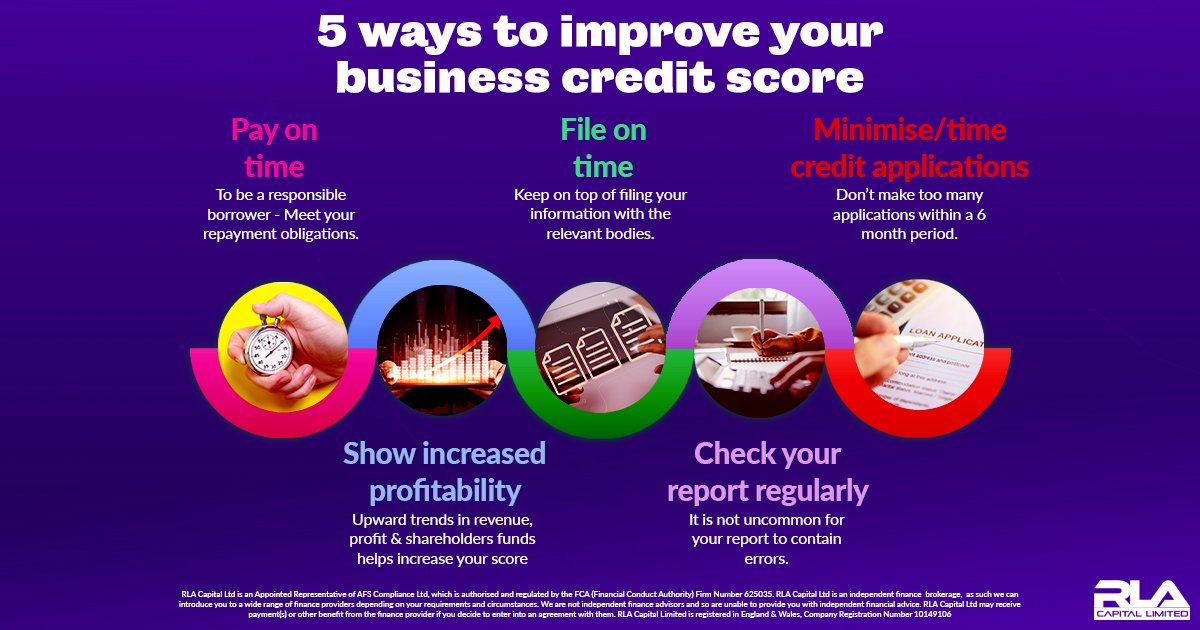Quick Tips on How Build Your Business Credit Score
Your credit score is an overall indication of how credit worthy your business is. Usually gauged on a scale of 0-100 and banded into poor, average, good and excellent.
Most lenders will use your score when assessing any credit or loan application.
Although your credit score can vary depending on which credit reporting agency a lender uses, such as Creditsafe, it will always be something the lender looks at when assessing a finance application.
As there are a wide range of businesses in the UK, each with varying financial positions, different lenders will consider a different range of scores.
While some lenders will only consider "good" scores, others will cater for lower "bad" credit scores, meaning most businesses will have access to funding.
As a general rule of thumb, the lower your credit score, the more expensive your lending options will be. However, some lenders will consider what is called a "story book lend" even if your business credit score is at the lower end of the scale.

5 ways to improve your business credit score
- Pay on time
- File on time
- Minimise and time credit applications
- Check your report regularly
- Demonstrate increased profitability
Why is it important to pay on time?
Ideally you need to be a responsible borrower, one that meets your repayment obligations. This means paying on time and in full.
If you have past issues with paying on time, this will negatively impact your score and lenders will see this as a negative when considering finance applications.
Missed and late payments will stay on your file for 6 years, after which they will no longer affect your score. CCJs and defaults will also appear on your credit file and will have a negative impact on lenders when considering finance applications.
Why is timing credit applications important?
Another point of interest is your application behaviour. It is important to minimise and time credit applications within short periods of time. If you have made several applications in short period of time this can make you seem credit hungry and can have a negative impact on your chances of approval.
This is why it is important to not make too many applications within a short period of time.
Why should you check your report regularly?
It is worth checking you credit report at regular intervals, as it is not uncommon for your report to contain errors.
If you do find errors in your report, you will need to contact the reporting agency to discuss having the errors corrected. Most reporting agencies will correct errors on your behalf by contacting the company who filed the error, however you may need evidence to support your claim.
Sometimes you will need to contact the credit company who filed the error yourself to query the error and ask for it to be updated.
This can be a lengthy process and any updates to your file can take up to 6 weeks or more to show.
Demonstrate increased profitability
Upward trends in turnover, profits and shareholders funds will help increase your business credit score.
Lenders will request to see your company accounts to assess profitability and financial stability. Having accurate accounts to hand when a lender requests them is very important. If your accounts are outdated and don't show updated profits, this can affect your chances of approval.
Making sure that you have posted accurate accounts to Companies House is also extremely important as lenders will most likely compare your supplied accounts to those published.
If there are any inaccuracies in your supplied and published accounts, this will cause delays in your application and may result in a decline, if there is not a valid reason for the accounts not matching.
What affects credit scores?
There are a range of factors that affect your credit score is calculated, including:
- Your credit history - past applications and repayment profiles
- Any CCJs or defaults
- Number of credit accounts - past and present
- Companies House details
Lenders will look at your credit file to help then gain a better picture of your company's credit status, finances and your borrowing behaviour.
Your credit score can have a direct impact on
- Approval Rates
- Borrowing Amounts
- Interest Rates
For new starts or businesses that have not used finance before it can be harder to obtain finance as there is little credit history for lenders to assess.
Luckily there are a range of lenders that specialise in new start businesses, as they understand the difficulties you can experience in obtaining credit.
Whilst RLA Capital cannot offer financial advice, we can provide various business loans to assist with cash flow. RLA Capital would recommend speaking with your accountant if you are experiencing cash flow problems.
